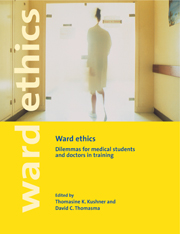Book contents
- Frontmatter
- Contents
- Acknowledgments
- List of contributors
- Prologue. Breaking the silence
- Letter from a young doctor
- Part I On caring for patients
- Section 2 Problems in truth-telling
- Section 3 Setting boundaries
- Part II On becoming a “team player”: searching for esprit de corps and conflicts of socialization
- Section 5 Argot, jargon, and questionable humor: assuming the mantle at the patient's expense
- Section 6 Making waves: questioning authority and the status quo
- Section 7 Perceiving misconduct and whistle-blowing: observing peers or superiors commit an act deemed unethical
- Epilogue: Using this book
- Glossary
- Index
Section 3 - Setting boundaries
Published online by Cambridge University Press: 05 February 2015
- Frontmatter
- Contents
- Acknowledgments
- List of contributors
- Prologue. Breaking the silence
- Letter from a young doctor
- Part I On caring for patients
- Section 2 Problems in truth-telling
- Section 3 Setting boundaries
- Part II On becoming a “team player”: searching for esprit de corps and conflicts of socialization
- Section 5 Argot, jargon, and questionable humor: assuming the mantle at the patient's expense
- Section 6 Making waves: questioning authority and the status quo
- Section 7 Perceiving misconduct and whistle-blowing: observing peers or superiors commit an act deemed unethical
- Epilogue: Using this book
- Glossary
- Index
Summary
Defining professional parameters can be especially complex and confusing for doctors in training. What counts as too close so that professionalism is lost? What counts as so removed as to lose the special connection that defines the physician–patient relationship? The blurry state of boundaries is underlined in our time by shifting role expectations and the importance of patient autonomy. Physicians owe patients clarity as to what they will or will not do, and patients must be clear with their physicians about their own values and limits.
In this section we stress three of the most difficult boundaries to establish in the physician–patient relationship. They define boundaries of professional parameters. Might sexual relations initiated by patients be justified? What are appropriate responses to sexual innuendoes? How to handle the common complaint about investing emotional energy in difficult patients? Is losing compassion inevitable?
- Type
- Chapter
- Information
- Ward EthicsDilemmas for Medical Students and Doctors in Training, pp. 97Publisher: Cambridge University PressPrint publication year: 2001
- 1
- Cited by

